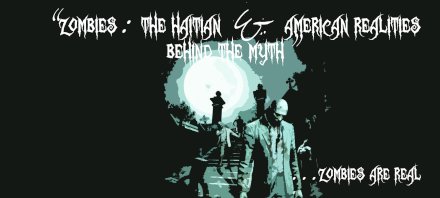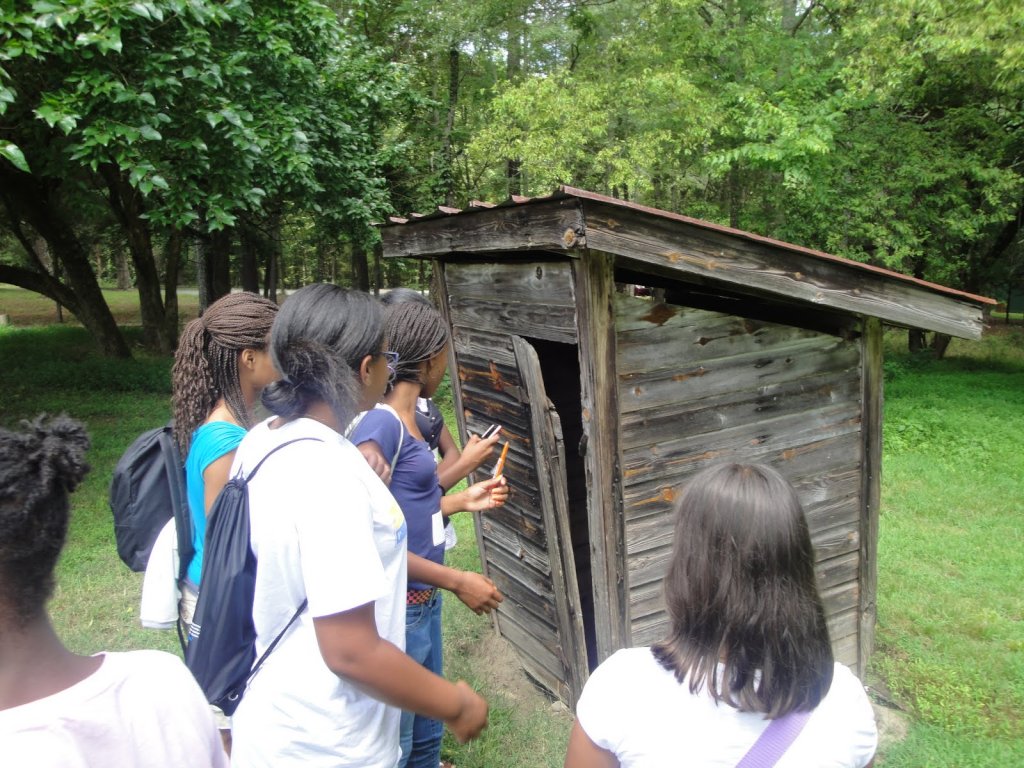Zombies are real.
Zombies, or zonbi , actually exist in Haiti, though they are a small part of the rich Haitian cosmology and are quite different from the ever-changing US movie zombie. Some zonbi are simply ritually captured and mobilized spirits of the dead. Others are essentially people poisoned and enslaved based upon a secret society’s judgment that they have committed an unforgiveable crime.
The US obsession with the zombie began with the US occupation of Haiti (1915-1934) as part of a narrative of savagery among the black and the colonized, which justified the colonizer’s own savagery. Arguably, the ever-proliferating image of the zombie is goldmine of the history of popular American anxieties about race, epidemics, immigration, communism and capitalism in the 20th and 21st centuries.
Please join us for an unprecedented discussion about race and the use of black cultures in the fantasy of US popular culture, where we will give equal time to the realities of Haitian sacred and social life and the role of zombies within it. Hear from the leading priests and experts on race and the movie industry, monsters, the psychology of nightmares, Caribbean literature, and Haitian religion and society, as well as the Cuban and western African counterparts of the zonbi . And through the Haitian sacred dance performance and class on Friday, we will learn with both mind and body.
The Center for African and African American Studies at Duke University
proudly presents
“ZOMBIES: THE HAITIAN AND AMERICAN REALITIES BEHIND THE MYTH”
19-21 MARCH 2015
THURSDAY, MARCH 19
7:00 p.m. – 8:30 p.m.
Keynote Lecture and Performance
Richard White Building, Room 107
Erol Josué
Vodou High Priest, Celebrated Dancer & Director of the Haitian Bureau of Ethnology
FRIDAY, MARCH 20
East Duke, Room 209
“The Haitian
Zonbi
”
10:00 a.m.-12:30 p.m.
Manbo Asogwe
Marie Maude Evans
of the
Sosyete Nago
(Jacmel & Boston)
Terry Rey
, Temple University
Alissa Jordan
, University of Florida
Laënnec Hurbon
, Université du Québec
Barry Gaspar
, Duke University (Discussant)
Lunch will be served.
12:30 p.m.-1:30 p.m.
Dance Performance by Sosyete Nago
1:45 p.m.-2:15 p.m.
East Duke, Room 209
“ Se Pa Tout Zombi Ki Rete Nan Simetye"/ "Not Every Zombie Stays in the Cemetery"
“The
Zonbi
in Comparative Context: the Haitian
Lougawou
, the Kongo
Nkisi
, & the Cuban
Mfumbi
”
2:30 p.m.-5:00 p.m.
Patrick Sylvain
, Lesley College
Wyatt MacGaffey
, Haverford College
Todd Ramón Ochoa
, UNC-Chapel Hill
David Font-Navarrete
, Duke University (Discussant)
Haitian Sacred Dance Class
ADF, Samuel H. Scripps Studio
721 Broad Street, 2nd floor
Limited to 70 participants.
5:45 p.m.-7:15 p.m.
Master Dancer:
Taleah Pierre-Louis
, Sosyete Nago
Master Drummers:
Emmanuel Lerbout
, Sosyete Nago
Jackson Danger
, Sosyete Nago
Jean Frenel Misere
, Sosyete Nago
SATURDAY, MARCH 21
East Duke, Room 209
“The Zombie as Metaphor”
10:00 a.m.-12:30 p.m.
Don Cosentino
, UCLA
Kaiama Glover
, Columbia University
Maria Primaggiore
, North Carolina State University
Jean-Daniel Lafontant
, Haitian Cultural Foundation & Musée d’Art Haïtien
Michaeline Crichlow
, Duke University (Discussant)
Lunch will be served.
12:45 p.m.-1:45 p.m.
“The Zombie in Mass Media”
2:00 p.m.-4:30 p.m.
Adam McGee
, Harvard University
Elizabeth McAlister
, Wesleyan University
Wade Davis
, National Geographic Society
Diane Nelson
, Duke University (Discussant)
“The Other World in Our Midst: The Art of the Sacred in Haitian Vodou”
An Exhibition and Gallery Talk Narrated by Priests, Scholars and Musicians
Friedl Building, Room 225
5:00 p.m.-6:00 p.m.
Ceremony for the Lwa, the Gods of Haitian Vodou
Location to be announced.
Limited to 40 participants.
All participants must wear white.
Co-sponsored by:
Forum for Scholars and Publics
Franklin Humanities Institute
Department of African and African American Studies
Center for Documentary Studies
Department of Cultural Anthropology
The Center for African and African American Studies website: http://caaar.duke.edu/lecture-series/zombie-conference


